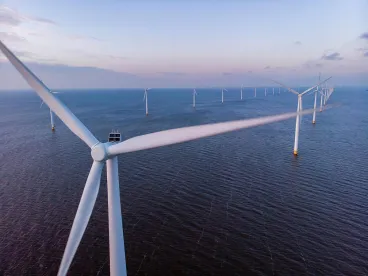The federal government has successfully defended its approvals of the Vineyard Wind project offshore Massachusetts (Project), setting the stage for further decisions as other challenges proceed. Vineyard Wind is the first modern utility-scale offshore wind project to reach the construction phase in the US market. On May 17, 2023, Judge Indira Talwani of the U.S. District Court for the District of Massachusetts denied claims seeking to invalidate two of the project’s key federal approvals on the grounds that they did not adequately consider impacts on the North Atlantic right whale in violation of the Endangered Species Act (ESA) and the National Environmental Policy Act (NEPA).[1] The court found that the federal government did not violate the ESA or NEPA when issuing the challenged approvals.
Plaintiffs Nantucket Residents Against Turbines (ACKRATS) and Vallorie Oliver, a Nantucket Island resident and founding member of ACKRATS,[2] filed suit against the Bureau of Ocean Energy Management (BOEM) and the National Marine Fisheries Service (NMFS) alleging in relevant part that:
-
NMFS acted arbitrarily, capriciously, and unlawfully by failing to consider adequately the Project’s impact on North Atlantic right whales in its 2021 Biological Opinion and instead concluding the Project would not jeopardize the species in violation of the ESA;
-
NMFS and BOEM violated and continue to violate Section 7(a)(2) of the ESA by failing to ensure through consultation that BOEM’s approval of impacts of the Project will not jeopardize the North Atlantic right whale; and
-
BOEM violated NEPA by failing to take the requisite “hard look” at the environmental consequences to the North Atlantic right whales, and instead issued a Final Environmental Impact Statement (FEIS) that contained the same procedural and substantive defects as the 2021 Biological Opinion.
In response, BOEM and NMFS argued that (1) ACKRATS did not have standing; (2) ACKRATS failed to provide adequate 60-day notice as required by the ESA; (3) NMFS’s 2021 Biological Opinion complied with the ESA; (4) BOEM reasonably relied on NMFS’s 2021 Biological Opinion; and (5) BOEM’s FEIS complied with NEPA and adequately assessed potential impacts to North Atlantic right whales.
On the issue of standing, the court found that ACKRATS did have standing to bring certain ESA and NEPA claims on the grounds that Oliver has seen right whales in the waters around Nantucket, including waters potentially affected by the Project, and has sufficiently “concrete” plans to observe right whales in the waters around Nantucket in the future. The court also found that ACKRATS’ letter giving BOEM the requisite 60-day notice required by the ESA was sufficient to bring most claims alleged against the government, despite not explicitly listing certain grievances.
While ACKRATS cleared the standing bar on most issues, the court found that its claims failed on the merits. The court considered ACKRATS’ NEPA and ESA claims together, as the only surviving NEPA claim for which the plaintiffs had standing alleged that the FEIS “parrot[ed] the flawed analysis and conclusions set forth in the 2021 [Biological Opinion].”[3] The court found that NMFS did not act arbitrarily, capriciously, or unlawfully in its consideration of the Project’s impact on North Atlantic right whales in the 2021 Biological Opinion and in its conclusion that the Project would not jeopardize the species in violation of ESA Section (7)(a)(2). Specifically, the court was unpersuaded by ACKRATS’ argument that NMFS failed to consider the “best scientific and commercial data available,” as NMFS did consider many of the studies ACKRATS pointed to as best available but either disagreed with the studies’ conclusions or concluded they did not qualify as the “best available.” The court declined to second-guess NMFS’s decisions on which studies to consider.
The court was similarly unpersuaded by ACKRATS’ arguments that the 2021 Biological Opinion and FEIS failed to adequately consider impacts of certain project activities on North Atlantic right whales, including vessel strikes, pile driving noise, operational noise, increased stress due to loss of foraging opportunities, entanglement in fishing gear and cumulative impacts of other potential wind farms. The court found that these impacts “were adequately identified and studied . . . within the limits fixed by the APA.”[4] The court repeatedly noted that ACKRATS’ disagreement with the government’s conclusions does not demonstrate that the agencies failed to properly analyze the Project’s impacts on the environment and that allegations without supporting evidence do not overcome the court’s deference to the agencies’ analyses.
The court’s broad denial of ACKRATS’ claims is a significant victory for BOEM, NMFS and the Project, with positive implications for the industry as a whole. BOEM continues to push forward with its review of dozens of construction and operations plans for offshore wind projects. The court’s opinion confirms the agencies’ analyses concerning the Project, offering useful precedent for three other challenges still pending before Judge Talwani concerning the Project and for other offshore wind projects that are still in the permitting process.
FOOTNOTES
[1] Nantucket Residents Against Turbines, et al. v. BOEM et al., No. 1:21-cv-11390-IT, Dkt. No. 130 (May 17, 2023) (“Opinion”).
[2] The Plaintiffs refer to themselves as “ACKRATS.” The Nantucket airport is known by its aviation code, “ACK.”
[3] Opinion at 37.
[4] Opinion at 45 (citing United States v. Coalition for Buzzards Bay, 644 F.3d 26, 31 (1st Cir. 2011)).





 />i
/>i
